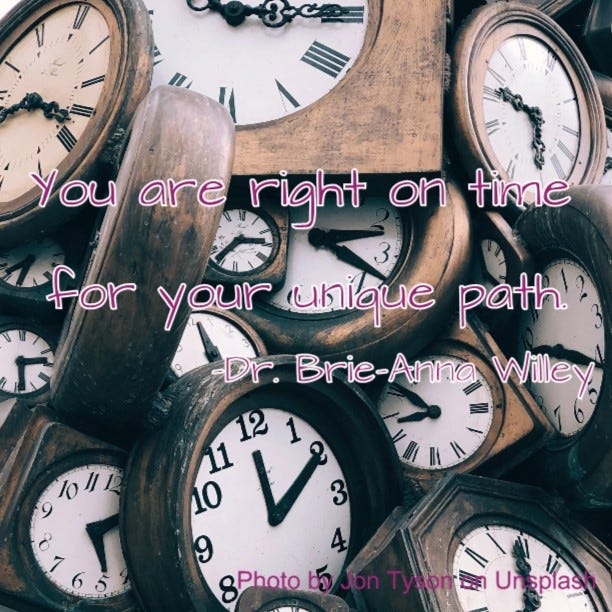Perceived Rejection
Have you ever been on a call where you felt a lack of confidence, pressure to say the right things, and hyper-aware of your own nervousness as well as the worry that the other person could tell you were off your game? Then, because you noticed their reaction, you started acting even weirder, making the whole situation spiral into what felt like some form of criticism or rejection?
That was me the other day. I saw the conversation tanking, and no matter what I did, I couldn't fix it. The more I tried, the worse it got and the more I stuck my foot in my mouth. Maybe it’s my own perfectionism I am battling here, or maybe it’s some old wounds or my own neurodivergence. Not sure.
The Land of Misfit Toys
Do you ever feel a little off sync with the world? I often feel this way. My good friend Laura Zane (who I vented to later) often affectionately says we are part of “The Land of Misfit Toys.”1 2 She embraces being a misfit, and honestly, I love that perspective. It reminds me that we all have a place, even when we feel like we don’t fit into traditional molds.
Internalized Rejection & Self-Reflection
I don’t know how others experience rejection, but for me, I often internalize it. Over the years, I’ve worked on managing it better. However, if I’m feeling insecure, lacking confidence, or struggling with imposter syndrome, perceived slights can hit harder than they usually would.
Through self-analysis, I’ve realized that compassion fatigue can also play a role. As a helper (a medical professional, therapist, coach, pastor, or mentor), we pour so much into others that we sometimes forget to check in with ourselves.3 Maybe this experience was revealing an area I need to work on more.
The Role of Self-Rejection, Self-Doubt & Comparisons
Self-Rejection
Beyond overt rejection, we may also battle self-rejection. How often do we tell ourselves, I can’t run a podcast, I’m not tech-savvy enough, I can’t speak in front of others, or I can’t write that book? These are stuck thoughts, limiting beliefs that hold us back.
The other day, I was about to hop on a live video call with
, and I sent a panicked email a few minutes before: What do I say? What are you going to ask me? I was convinced I wasn’t good at live conversations (even though I have done them many times before). Scott reassured me of course and reminded me that we are old friends and we are just having a conversation. And guess what? I did fine. And I didn’t put my foot in my mouth too much.Comparisons, Transitions & Video Games
As a neurodivergent person, sometimes it takes me longer to get to certain life levels (yes video game comparison here, lol). For a long time, I would compare myself to others and where I was in life. When I was a kiddo, I was a little immature and my birthday was right on the cut-off line for school, and I started kindergarten at six instead of five. It wasn’t a big deal to the adults, but to a child, it was!
From the beginning I felt a little behind. I was a bit older than my peers throughout grade school, high school and college, I finished later than my peers or needed to take time off for various reasons. (You know, I have never talked about this!)
As I grew in my career and path, at one point, I worked at Vocational Rehabilitation and clients would express to me things like, “I’m too old to start college” or “It’s too late to change careers.” But I adopted the perspective of my mentor, who always said, “The time will pass anyway, so why not focus on a goal?” I shared that perspective with my clients. And through a lot of self-analysis, prayer, and listening to what I felt the Lord was saying to me, I learned that I am right on time for my unique path.
So I made a meme out of it to remind myself and my clients about this.

Schlossberg’s transition theory4 5 6 echoes this idea—our lives start on a similar path to those around us, but as we experience different transitions, our trajectories change. Whether it’s career shifts, family changes, or unexpected life events, these transitions shape our individual journeys. According to Schlossberg (1981), adapting to life’s changes involves assessing our resources, support systems, and personal strengths. Instead of seeing change as a setback, we can reframe it as an opportunity to grow in a new direction.
Is Rejection Always a Bad Thing?
Going back to the initial reason I started writing this, feeling a tiny bit rejected. I did some thought management.
When we run businesses, isn’t it better for someone to say “no” upfront rather than work with someone they don’t align with?
What about perceived rejection? Sometimes, it's not a rejection or maybe the person didn’t mean for it to be perceived that way. Maybe the person got busy. Maybe their inbox is overflowing. Maybe ten other things happened at once. Not every silence or abrupt ending means disinterest.
Sources of Wisdom
Gaining Perspective
Throughout the years, I have absorbed a lot of devotionals and scriptures about the love and acceptance that the Lord offers to us. I’m reminded of Isaiah 61 (New International Version), which talks about healing the “brokenhearted” and giving us “beauty for ashes.”
I’m also reminded of Isaiah 40:31 (New International Version):
“but those who hope in the Lord will renew their strength. They will soar on wings like eagles; they will run and not grow weary; they will walk and not be faint.”
This is a scripture I often think of when I am feeling overwhelmed or like I don’t know where to go next.



Some additional favorite scriptures are Psalm 55:22 (Amplified Bible), which helps me express, then contain, and manage my feelings and give them to the Lord when they are too heavy for me. I guess I turn to scriptures that help me feel supported and loved when I feel rejected and alone.
Thankfully, I also have an amazing support system—my business and therapist besties. You know who you are! Having a community to lean on makes all the difference when moments like this happen.
The Bigger Picture
I was talking about this with
the other day, and he was saying that some industries, like therapy or website development (or plumbing or various other services), may not require much sales because potential clients already know they need help. Coaching, on the other hand, isn’t always something people realize they need. Maybe they weren’t ready. Maybe they had other priorities. Maybe they genuinely didn’t need the particular help I could provide. And that’s okay.There’s also the reality that some coaches have sold expensive programs that didn’t provide much value, making potential clients skeptical. We are competing against that skepticism.
Managing Rejection in Business
Self-Compassion: Treat yourself with the same kindness you’d offer a friend.
Look at the Whole Picture: Not every rejection is about you. People have their own struggles and distractions.
Walk Away & Let It Go: Brush the dust off your feet. (Or as Elsa apparently says, Let it go.) I hear this from my business besties—I have never actually seen Frozen, lol.
Reach Out for Support: Talking to your team, friends, or peers can help process emotions and reframe rejection.
Sell with Integrity: Scott Perry often talks about this. We don’t want pressured sales—we want people to buy from us who genuinely benefit from what we offer.
Final Thoughts
Going back to that perceived rejection, part of me initially wanted to say, What on Earth!? That was rude! But instead, I took a break, talked it out with my business besties, and it helped a lot.
At the end of the day, rejection—whether intended or perceived—sometimes hits me hard. If I’m feeling confident, I can brush it off. If I’m feeling vulnerable, my brain jumps to What did I do wrong? But I’m working on managing this better.
And when I remember that Jesus was rejected, but did not let it shake His identity or mission—I find strength in that.
How about you? How do you handle rejection with your work?
-Dr. Brie Willey
Zane, L. (n.d.). Online/Virtual Therapy for Misfits in Florida. Sage Synergy Counseling and Wellness. Retrieved February 7, 2025, from https://www.sagesynergy.net/lakewood-ranch-florida-lwr-misfit
Rankin, A. Jr., & Bass, J. (Producers), & Marks, J. D. (Writer). (1964). Rudolph the Red-Nosed Reindeer [Television special]. Videocraft International, Ltd.
Willey, B. M., (2023). Understanding the Experiences of Compassion Fatigue Among Counselors in Private Practice: A Phenomenological Approach. Doctoral Dissertations and Projects. 4446. https://digitalcommons.liberty.edu/doctoral/4446
Anderson, M., Goodman, J., & Schlossberg, N. (2021). Counseling adults in transition: Linking Schlossberg’s theory with practice in a diverse world (5th ed.). Springer Publishing.
Schlossberg, N. K. (1981). A model for analyzing human adaptation to transition. The Counseling Psychologist, 9(2), 2–18. https://doi.org/10.1177/001100008100900202
Schlossberg, N. K. (1984). Counseling adults in transition: Linking practice with theory. Springer Publishing.





I am glad I saw this story. I have always struggled with rejection especially with art stuff, because it is you that is rejected. Maybe that is not fashionable to say, but it is true. I find myself lost on social media and doing the kind of marketing that evidently must be done. Negativity can be overwhelming. Anyway, I wrote something about that:
https://open.substack.com/pub/strawbridgeideas/p/raging-negativity-and-the-artists?r=333v1n&utm_campaign=post&utm_medium=web&showWelcomeOnShare=false
Dr. Brie, thank you so much for sharing yourself, experiences, and thoughts here! 🫶🏽 Rejection and I have a long history. 🤪I’d say after being divorced twice, part of me takes rejection on the business side of things really personally. Which can lead to me shutting down and not putting myself out there. That said, having healed from those hardships, also has helped me put my value and identity in Christ, which allows me to not take “rejection” personal. It helps me, as I learned from Rob Bell, “give my gift and walk away.” This mentality really aids me a lot. I do my best to offer the gift of my writing, yoga teaching, life coaching, or soul care to others—and let what happens, happen. What others make of it, respond to, etc. is more about them, as you remind us, than me. Thank you! I hope you have a lovely day!